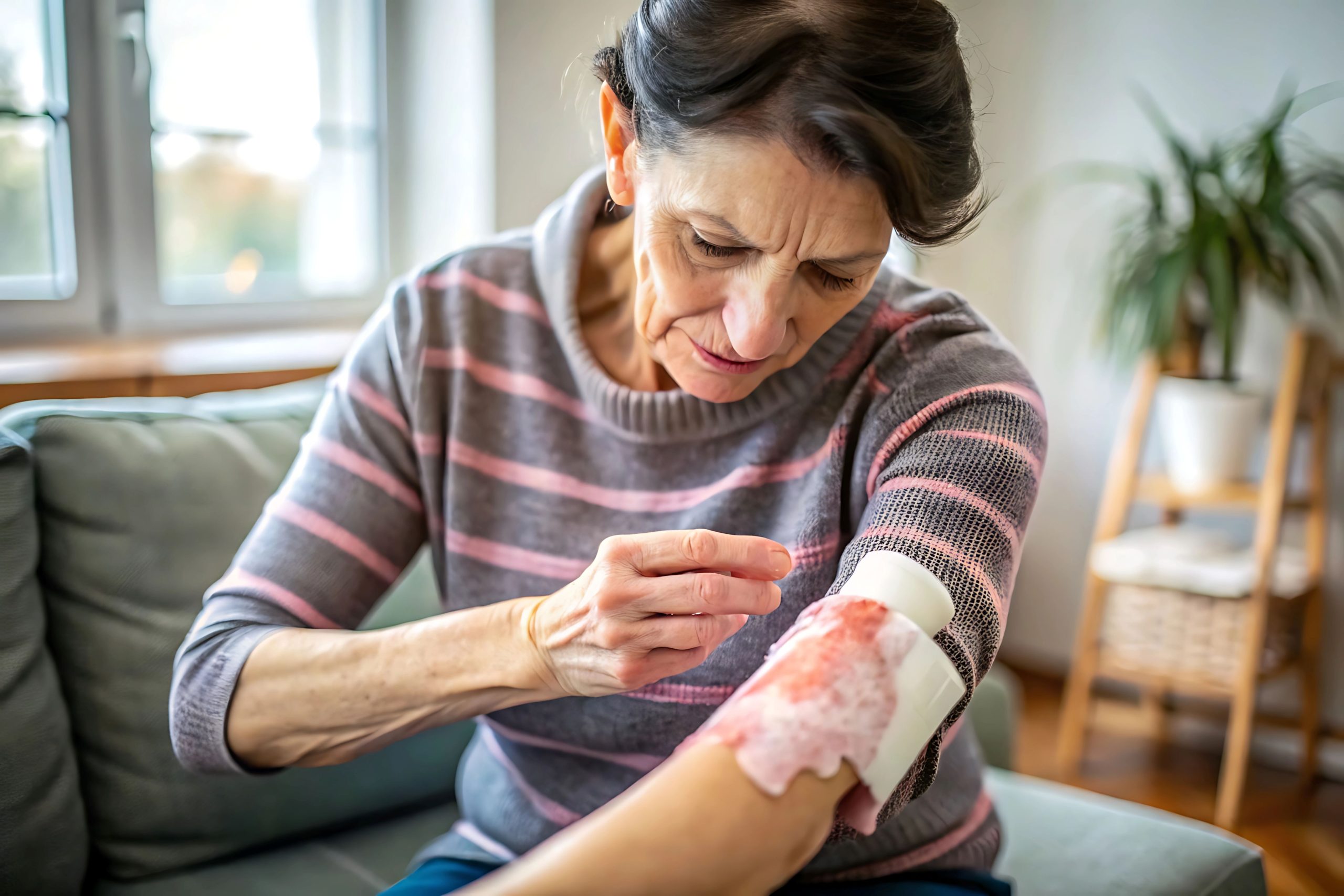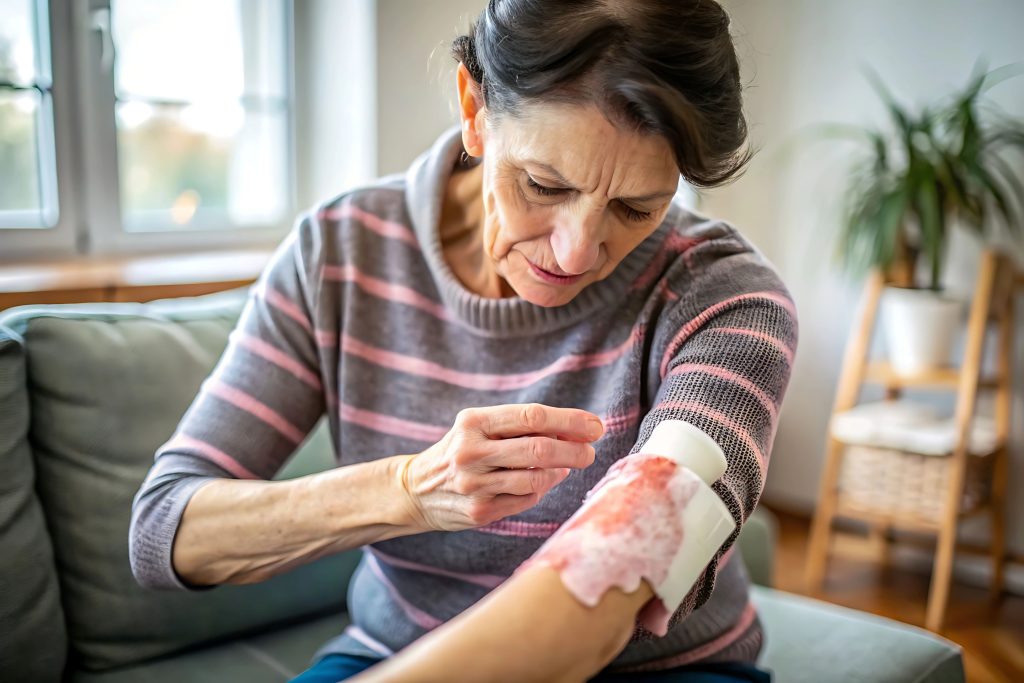
How Age and Lifestyle Affect Chronic Wound Healing
How Age and Lifestyle Affect Chronic Wound Healing
Table of Contents
ToggleQuick Summary – How Age and Lifestyle Affect Chronic Wound Healing
- Aging Slows Natural Healing – Reduced collagen production, slower cell turnover, and weaker immune responses delay wound closure in older adults.
- Circulation Declines With Age – Age-related vascular issues limit oxygen and nutrient delivery, slowing recovery.
- Nutrition is Key – Diets rich in protein, vitamins A and C, zinc, and iron significantly improve healing speed.
- Lifestyle Choices Matter – Smoking, excessive alcohol, poor sleep, and stress hinder the body’s ability to repair tissue.
- Exercise and Healthy Habits Boost Recovery – Light physical activity, weight management, and proper hydration promote faster wound healing.
Chronic wounds, those that don’t heal within the expected timeframe, can be frustrating, painful, and impact day-to-day life. Several factors influence how quickly (or slowly) these wounds recover, and two of the most significant are age and lifestyle. In this blog, we’ll explore how aging affects the body’s natural healing processes, how lifestyle choices such as diet, physical activity, and smoking play a role, and what you can do to promote faster recovery.

The Connection Between Age and Chronic Wound Healing
As we get older, our bodies naturally go through changes that can slow wound recovery. Aging affects nearly every stage of the healing process, from the moment a wound forms to the final phase of tissue remodeling.
1. Slower Inflammatory Response
The first stage of wound healing involves inflammation, which helps fight infection and clear damaged tissue. In older adults, this inflammatory response tends to be slower and less effective, meaning bacteria and debris may linger longer at the wound site.
2. Reduced Collagen and Elastin Production
Collagen and elastin are key proteins responsible for skin strength and flexibility. With age, production of these proteins declines, making skin more fragile and slower to repair itself.
3. Decreased Circulation
Healthy circulation delivers oxygen and nutrients to wounds, but older adults are more prone to reduced blood flow due to conditions like high blood pressure, heart disease, or peripheral artery disease. This slows down tissue repair and increases the risk of chronic wounds.
4. Thinner Skin and Lower Cell Turnover
Over time, the skin’s outer layer becomes thinner, and cell turnover slows. This not only makes injuries more likely but also means they take longer to close and fully heal.
5. Higher Risk of Coexisting Conditions
Older individuals are more likely to have conditions such as diabetes, obesity, or immune deficiencies, which can all interfere with proper wound healing.
Even though age is a factor you can’t control, early intervention and specialized treatment can help counteract many of these challenges. Our chronic wound treatment services are designed to address age-related healing barriers and improve outcomes for patients of all ages.
How Lifestyle Choices Influence Chronic Wound Healing
While aging is inevitable, lifestyle is something you can control, and it can make a big difference in how your body recovers from wounds. The way you eat, move, and manage stress directly impacts your body’s ability to heal itself.

1. Nutrition and Hydration
Food is fuel for healing. A diet rich in lean protein, vitamin C, vitamin A, zinc, and iron supports the creation of new skin cells and collagen. Hydration is equally important, water helps transport nutrients to the wound and keeps tissues flexible. If you’re looking for a detailed breakdown of the most important healing nutrients, our blog on the best nutrients to support faster chronic wound healing offers a complete guide.
2. Physical Activity and Circulation
Regular movement improves circulation, which ensures oxygen and nutrients reach the wound site. For people with limited mobility, even light activities, like short walks, gentle stretching, or using resistance bands, can help. However, it’s important to avoid any exercise that places strain on or near the wound.
3. Smoking and Alcohol Use
Smoking narrows blood vessels and reduces oxygen supply to tissues, significantly delaying healing. Alcohol, when consumed excessively, impairs immune function and hinders nutrient absorption. Quitting smoking and limiting alcohol intake can drastically improve healing speed.
4. Stress and Sleep Quality
Chronic stress elevates cortisol levels, which can suppress immune function and slow tissue repair. Sleep is when the body regenerates cells and repairs damage, so consistently poor sleep can stall recovery. Incorporating stress management practices like meditation, deep breathing, or light yoga can support better healing.
5. Weight Management
Excess weight can put additional pressure on wound sites, especially in the lower body, and may increase inflammation throughout the body. Maintaining a healthy weight through balanced eating and activity can reduce these obstacles.
Lifestyle changes don’t just speed up recovery, they also lower the risk of wounds becoming chronic in the first place. In the United States, where sedentary habits, processed food diets, and rising rates of diabetes are common, adopting healthier daily habits is one of the most effective ways to improve wound healing outcomes.
Practical Tips for Supporting Faster Recovery
If you’re dealing with a chronic wound, here are some steps to maximize your healing potential:
- Seek Professional Care Early – Our chronic wound care services offer tailored treatments that address both the wound and the factors slowing your recovery.
- Follow a Healing-Focused Diet – Choose foods rich in protein, vitamins, and minerals while staying hydrated.
- Stay Active Safely – Incorporate low-impact movement to boost circulation without stressing the wound.
- Avoid Tobacco and Limit Alcohol – Eliminating these can significantly shorten healing time.
Manage Chronic Conditions – Work closely with your healthcare provider to keep underlying health issues under control.
Conclusion:
Age and lifestyle both play powerful roles in determining how quickly a chronic wound heals. While aging naturally slows the process, making positive lifestyle choices, such as eating nutrient-rich foods, staying active, avoiding tobacco, and managing stress, can help offset these effects.
If you or a loved one is struggling with a non-healing wound, explore our chronic wound care services to learn how we can help. For more guidance on how we work with patients, feel free to contact us today to see how our personalized wound care solutions can make a difference.
Frequently Asked Questions:
1. How does age impact chronic wound healing?
As we age, slower cell regeneration, reduced collagen production, and weaker immune responses delay the healing process.
2. Can older adults heal wounds as quickly as younger people?
Not usually, older adults tend to heal more slowly, but proper wound care and healthy habits can help speed recovery.
3. Why is collagen important for wound healing?
Collagen provides structure and strength to skin, helping wounds close and tissue rebuild effectively.
4. How does poor circulation affect wound healing?
Poor circulation reduces oxygen and nutrient delivery to wounds, slowing tissue repair and increasing infection risk.
5. Which lifestyle factors slow wound healing?
Smoking, heavy alcohol use, poor diet, lack of exercise, and chronic stress can all delay healing.
6. Can diet improve chronic wound recovery?
Yes, nutrient-rich foods containing protein, vitamins A and C, zinc, and iron support faster cell repair and healing.
7. Does exercise help with wound healing?
Light to moderate exercise boosts circulation, delivering oxygen and nutrients essential for healing.
8. How does stress affect wound healing?
Chronic stress raises cortisol levels, which can suppress the immune system and delay tissue repair.
9. Is hydration important for wound healing?
Absolutely, staying hydrated helps transport nutrients and maintain skin elasticity for faster recovery.
10. How can I get professional help for a chronic wound?
Specialized care like chronic wound treatment services can address underlying causes and speed up healing.


